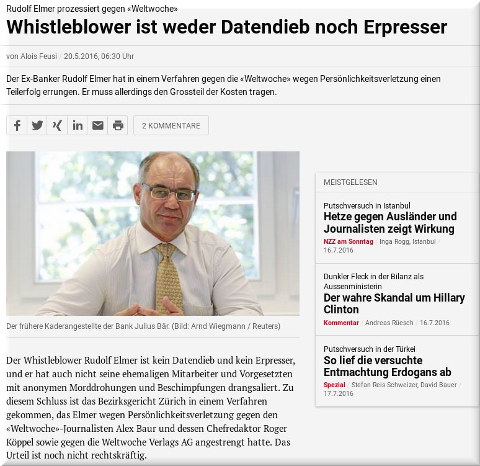

Whistleblower ist weder Datendieb noch Erpresser
EARLIER this year we wrote about rumours of fraud at the EPO and not too long ago we became witnesses to the pretext of "fraud" as as exploited to spy on staff and grossly violate their privacy or data security (in a way that no member state would tolerate). The members of the GCC who are members of the CSC wrote the following text: "We obviously do not support fraud and so consider it perfectly legitimate that some controls (checks and balances) are introduced in order to detect and/or prevent fraud also in the field of the healthcare insurance. However, this raises an additional big concern linked to the new contract and its external administrator: fraud control measures and the possible involvement of the EPO’s Investigation Unit. We are completely kept in the dark as to how the EPO intends to put in practice these controls. What will be the role of Cigna who are obviously best positioned (access to the data) to detect fraud)? Are they bound to respect national laws? What will be the role of the Investigative Unit? How will the different parties cooperate? How will medical secrecy be preserved? Which laws will apply at which steps? Why does the Office not collaborate with (local) national prosecutors since this would be compatible with Article 20, EPC? Not only have none of these questions been answered, we have not heard about any safeguards. We fear that this is an area that may raise serious problems in the future with possible damage to the EPO’s reputation. Although we have not been required to give an opinion despite the blatant impact that this new contract will have on staff employment conditions, we nevertheless recommend that the President should not implement the planned modifications as long as a joint Committee has not been established."
"The way things work at the moment is a recipe for disaster because the Office already fails to attract top talent -- the very kind of talent which it takes to deliver a good service and justify the high fees associated with EPs (grant, renewal, search etc.)."We often wonder how many violations it would take for Eponia to finally come under proper scrutiny from member states (beyond a slap on the wrist, at the very least a fine). The way things work at the moment is a recipe for disaster because the Office already fails to attract top talent -- the very kind of talent which it takes to deliver a good service and justify the high fees associated with EPs (grant, renewal, search etc.). To make matters worse, a lot of key staff has been leaving and continues to leave the Office (the growing numbers of departures that we see are irrefutable). A new comment in IP Kat asked: "What would the European Patent system look like in, say, 2 to 4 years?" Here is the full comment:
"Anonymous" from Saturday, 12 November 2016 is trying to change the subject, isn't he/she? The facts are quite simple: Battistelli got instructions from the Council not to fire staff members before new regulations are passed and did just the opposite.
That is the real problem here.
Battistelli is not doing what the Council wants. I asked what the Council can do and apparently the Council cannot do much because of the 3/4 of the votes clause. I said Battistelli just needs 10 countries to stay forever and follow his plans and nobody raised a credible objection. I don't see how a ministerial conference could solve that problem.
So let us imagine that Battistelli stays another few years to continue his plans. The Council cannot do much because of this blocking minority. What would the effect be? What would the European Patent system look like in, say, 2 to 4 years?